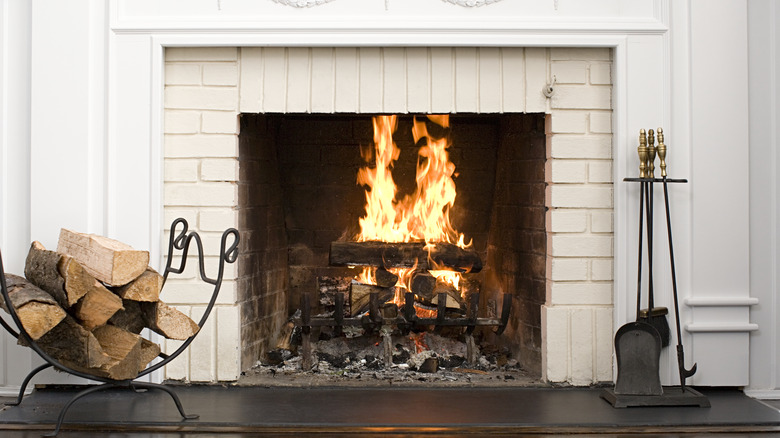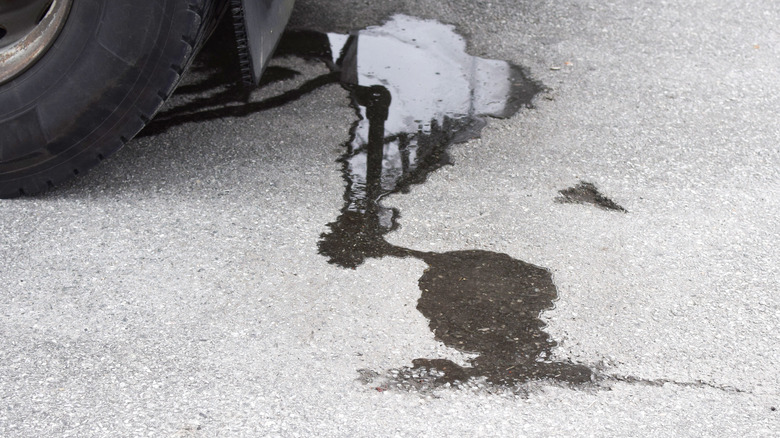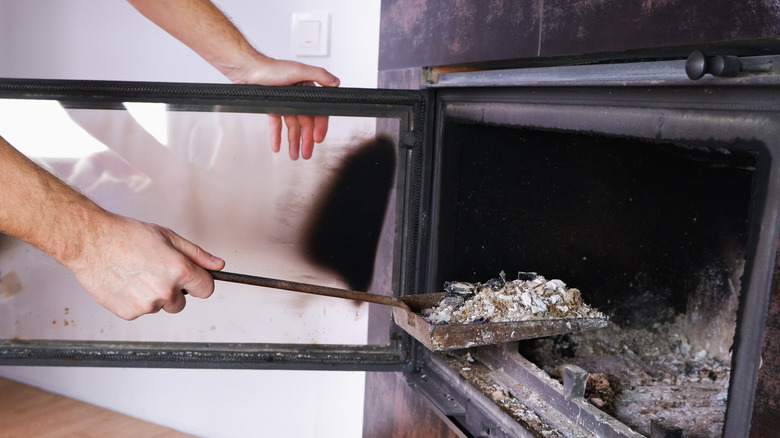Your Fireplace Is Burning The Secret Remedy For Driveway Oil Spills
We may receive a commission on purchases made from links.
Accidents happen, and at some point or another, it's possible that there will be some kind of oil staining on your driveway. Whether you're a dedicated DIYer, saving money by performing your own automotive maintenance — or your car has an unfortunate oil leak — driveway spills are a common occurrence. There are plenty of products, services, and YouTube tutorials promoting ways to remove these unsightly blemishes, but one of the easiest is already sitting in your home's hearth or outdoor fire pit — your fireplace ash.
When burned from untreated hardwood, cardboard, and paper, it's an excellent resource for soaking up oil spills. Not only is it more effective than other suggested products, such as kitty litter, but it also comes at no additional cost and is an environmentally responsible way to repurpose waste. Obviously it's important to prevent spills and leaks before they happen, and any handling of oil should be undertaken with great care. Keeping your car in peak condition will reduce the chance it will leak at all, but if it does, it's best to deal with it quickly.
Unattractive and dangerous
Oil stains in your driveway aren't just eyesores — they can also be quite dangerous. If your driveway is concrete, oil can damage the surface over time. Contaminants in the oil eat away at the composition of the driveway which results in costly repairs if the spill isn't dealt with quickly. Asphalt is even more at risk because it's much more porous than concrete. The oil seeps in faster and breaks down the asphalt, turning it into a cracked, crumbly mess much quicker than its normal wear rate.
Spilled oil in your driveway is also a hazard to your family and visitors — new spills are slick and can cause falls. More insidious, however, is the likelihood of tripping on the cracks and damage caused by the deteriorating driveway under the spill. Of course, oil spills are also deadly for the environment. Spilling just a single pint of oil in your driveway has the potential to cover the whole thing. Oil spilled or leaked in front of your home, left unattended, will be washed into stormwater drainage systems where it eventually pollutes the local waterways and endangers wildlife. To prevent all this, it's imperative spills are cleaned up right away.
Using fireplace ash to clean up your oil
When cleaning out your hearth, keep your fireplace ash in a metal bucket, so it's ready to use when needed. Be sure to use proper equipment like leather gloves and a fireplace shovel, and do not overfill your pail. There are a wide variety of ways ash is useful around the house, but one of the most efficient and significant uses is cleaning up oil spills or leaks. Ash is incredibly absorbent because of its high alkaline content. Just sprinkle it over the oil, making sure to cover the entire spill. It only takes a few minutes for the entire thing to be soaked up, and this works on old spills as well as new ones.
After the oil is absorbed, all you need to do is sweep it away. You shouldn't vacuum up fireplace ash, because it can damage your machine, but a sturdy outdoor broom and dustpan will do the trick. Believe it or not, you won't be able to tell the oil was ever there at all. Once you've swept them up, the ashes can be disposed of in your regular trash in most cases, but as they are technically oil absorbents, it's important to check with your local municipal guidelines.



